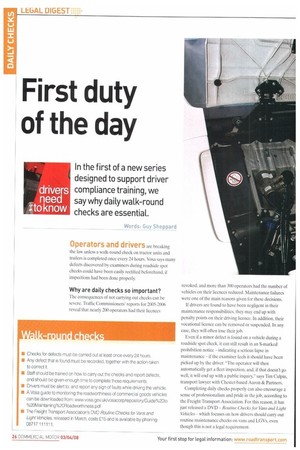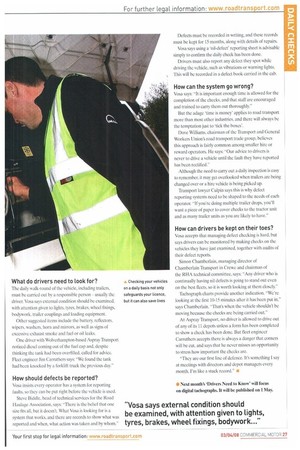First duty of the day
Page 26

Page 27

If you've noticed an error in this article please click here to report it so we can fix it.
In the first of a new series designed to support driver compliance training, we say why daily walk-round checks are essential.
Words: Guy Sheppard Operators and drivers are breaking the law unless a walk-round check on tractor units and trailers is completed once every 24 hours. Vosa says many defects discovered by examiners during roadside spot checks could have been easily rectified beforehand, if inspections had been done properly.
Why are daily checks so important? The consequences of not carrying out checks can be severe. Traffic Commissioners' reports for 2005-2006 reveal that nearly 200 operators had their licences revoked, and more than 300 operators had the number of vehicles on their licences reduced. Maintenance failures were one of the main reasons given for these decisions.
If drivers are found to have been negligent in their maintenance responsibilities, they may end up with penalty points on their driving licence. In addition, their vocational licence can be removed or suspended. In any case, they will often lose their job.
Even if a minor defect is found on a vehicle during a roadside spot check, it can still result in an S-marked prohibition notice indicating a serious lapse in maintenance if the examiner feels it should have been picked up by the driver. "The operator will then automatically get a fleet inspection, and, if that doesn't go well, it will end up with a public inquiry," says Tim Culpin, transport lawyer with Chester-based Aaron & Partners.
Completing daily checks properly can also encourage a sense of professionalism and pride in the job, according to the Freight Transport Association. For this reason, it has just released a DVD — Routine Checks for Vans and Light Vehicles which focuses on how drivers should carry out routine maintenance checks on vans and LGVs, even though this is not a legal requirement. What do drivers need to look for?
The daily walk-round of the vehicle, including trailers, must be carried out by a responsible person usually the driver. Vosa says external condition should be examined. with attention given to lights, tyres, brakes, wheel fixings, bodywork, trailer couplings and loading equipment.
Other suggested items include the battery, reflectors. wipers. washers, horn and mirrors, as well as signs of excessive exhaust smoke and fuel or oil leaks.
One driver with Wolverhampton-based Aspray Transport noticed diesel coming out of the fuel cap and, despite thinking the tank had been overfilled, called for advice. Fleet engineer Jim Carruthers says: "We found the tank had been knocked by a forklift truck the previous day."
How should defects be reported?
Vosa insists every operator has a system for reporting faults, so they can be put right before the vehicle is used.
Steve Biddle, head of technical services for the Road Haulage Association, says: "There is the belief that one size fits all, but it doesn't. What Vosa is looking for is a system that works, and there are records to show what was reported and when, what action was taken and by whom." Defects must be recorded in writing, and these records must he kept for 15 months, along with details of repairs.
Vosa says using a 'nil-defect' reporting sheet is advisable simply to confirm the daily check has been done.
Drivers must also report any defect they spot while driving the vehicle, such as vibrations or warning lights. This will be recorded in a defect book carried in the cab.
How can the system go wrong?
Vosa says: "It is important enough time is allowed for the completion of the checks, and that staff are encouraged and trained to carry them out thoroughly" But the adage 'time is money' applies to road transport more than most other industries, and there will always be the temptation just to 'tick the boxes'.
Dave Williams, chairman of the Transport and General Workers Union's road transport trade group, believes this approach is fairly common among smaller hire or reward operators. He says: "Our advice to drivers is never to drive a vehicle until the fault they have reported has been rectified."
Although the need to carry out a daily inspection is easy to remember. it may get overlooked when trailers are being changed over or a hire vehicle is being picked up.
Transport lawyer Culpin says this is why defect reporting systems need to be shaped to the needs of each operator. "If you're doing multiple trailer drops, you'll want a piece of paper to cover checks to the tractor unit and as many trailer units as you are likely to have."
How can drivers be kept on their toes?
Vosa accepts that managing defect checking is hard, but says drivers can be monitored by making checks on the vehicles they have just examined, together with audits of their defect reports.
Simon Chamberlain, managing director of Chamberlain Transport in Crewe and chairman of the RHA technical committee, says: "Any driver who is continually having nil defects is going to stand out even on the best fleets. so it is worth looking at them closely.
Tachograph charts provide another indication. "We're looking at the lirst 10-15 minutes after it has been put in," says Chamberlain. "That's when the vehicle shouldn't be moving because the checks are being carried out."
At Aspray Transport, no driver is allowed to drive out of any of its 11 depots unless a form has been completed to show a check has been done. But fleet engineer Carruthers accepts there is always a danger that corners will be cut, and says that he never misses an opportunity to stress how important the checks are.
"They are our first line of defence. It's something I say at meetings with directors and depot managers every month. I'm like a stuck record." •
0 Next month's 'Drivers Need to Know' will Focus on digital tachographs. It will be published on I May.
















































































































































































